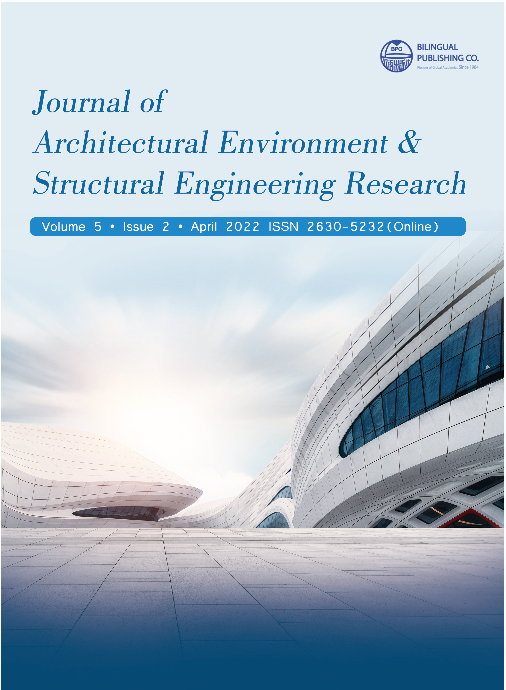-
415
-
263
-
213
-
197
-
172
Knot Types Used by Transformable and Rigid Linear Structural Systems
DOI:
https://doi.org/10.30564/jaeser.v5i2.4352Abstract
A knot is the joining place between two or more constructive elements in a framework or structure. They have a fundamental importance in the structure, according to their design they will be able to give a geometric configuration or another to the system and will also absorb certain forces or others. Depending on the movements they allow to the bars, there are rigid knots, articulated knots and slip knots. In this paper a study of cases about rigid knots or embedments used by structural systems so far will be presented. These types of knots prevent the rotation and movement of the constructive elements used for construction. In this paper also a study of cases about the articulated and slip knots used by transformable structural systems so far will be presented. An articulated knot allows the rotation but not the movement of the elements. A slip knot prevents movement in one of the three axes of the reference system, but not in the others, nor in the rotation between the elements. The research is focused in presenting a summary and comparison of rigid knots, articulated knots and slip knots that have been used in the structural design of some architecture. The union systems research will be crucial in this study. The investigation shows an important state of the art that provides technical solutions to apply on novel architectures based on rigid structural systems and articulated and slip structural systems. The research is useful to produce the current constructive solutions based on these constructive systems.
Keywords:
Knot; Join; Structure; Geometry; Force; Rigid; Embedment; Articulated; SlipReferences
[1] MediaWiki., 2006. Construction encyclopedia. http://www.construmatica.com/construpedia. (Accessed 10 May 2022).
[2] Motro, R., 2013. Nodes and Structures-A tribute to Stéphane Du Château. (IASS) Symposium 2013 Beyond the limits of man. Wroclaw, Poland. pp. 8. (in English)
[3] Estrela, C., 2014. The innovative structural conception in Stéphane du Château’s work: from metallic trusses to the development of spatial frames. Architectus. 4(40), 51-64. (in English)
[4] Chilton, J., 2000. Space Grid Structures (First ed.). Oxford, England: British Library Cataloguing. pp. 1-180.
[5] Makowski, Z., 2002. Development of jointing systems for modular prefabricated steel space structures. Paper presented at the Proceedings of the international symposium. Warsaw, Poland.
[6] Fentiman, A.E., 1959. Structural framework. US2931467A (Patent). https://patents.google.com/patent/US2931467. (Accessed 10 May 2022)
[7] Carracedo, J., 2005. Knot for reticular structures. WO 2006097545 A1 (Patent). https://patents.google.com/patent/WO2006097545A1/es?oq=Carracedo%2c+J.%2c+2005.+Patent+WO+2006097545+A1 (Accessed 10 May 2022)
[8] Vedoya, D.E., Prat, E.S., 2009. Large Span Structures. Technology and design. ITDAHu editions. pp. 1-243.
[9] Nieto, J., 1978. Synthesis of mechanisms. AC Publishing, Madrid. pp. 1-206.
[10] Rodríguez, N., 2005. Design of a structure that can be transformed by deformation of a flat mesh in its application to a quick-assembly shelter. Thesis of Polytechnic University of Catalunya, High Technique School of Architecture of Barcelona, Barcelona. pp. 1-297.
[11] Fuller, R.B., 1951. Building construction. US 2682235A (Patent). https://patents.google.com/patent/US2682235A/en?oq=Fuller%2c+R.B.+Building+construction.+US+2682235+(Patent)+1951. (Accessed 10 May 2022)
[12] Fuller, R.B., 1953. Flying Seedpot. Geodesic Dome Project, Washington University and Fuller Research Foundation, St. Louis https://www.bfi.org/about-fuller/resources/everything-i-know/session-11 (Accessed 10 May 2022)
[13] Pérez, E., 1961. Foldable stereo lattice structure. ES0266801 A1 (Spanish Patent). 3.185.164 (US Patent).
[14] Moore, A., 1967. Preassambled structural framework. US3325958 (Patent).
[15] Zeigler, T.R., 1977. Collapsible self-supporting structures. US4026313 (Patent).
[16] Zeigler, T.R., 1984. Collapsible/expandable structural module with split hub locking. US4473986A (Patent).
[17] Thomas, R., Swetish, T.R., Baumann, W.R., 2003. Foldable frame structure. US 6591849 B1 (Patent).
[18] Lee, D.S.H., Popovic, O., Kim, S.D., 2013. Study of the connection joint for scissor-type deployable structure for the possible application in emergency evacuation shelter. New proposals for transformable architecture, engineering and design. Ed. STARBOOKS Structural Architecture. pp. 105-109.
[19] Kim, S.D., D., Park, S.K., Jang, J.P., et al., 2013. A Study on Deployable Shelters Considering Biaxial Rotations of Joints. New proposals for transformable architecture, engineering and design. Ed. STARBOOKS Structural Architecture. pp. 111-114.
[20] Yokosuka, Y., Matsuzawa, T., 2013. Shape-finding Analysis for Variable Geometry Structures Formed by a Multilink Spherical Joint. New proposals for transformable architecture, engineering and design. Ed. STARBOOKS Structural Architecture. pp. 83-88.
[21] Anaya, J., Álvarez, M.D., Serrano, R., 2020. Union system for mobile reticular structures. ES 1238524 Y (presented Spanish patent). U. 201931716 (8) (utility Spanish model).
Downloads
How to Cite
Issue
Article Type
License
Copyright © 2022 Mª Dolores Álvarez Elipe

This is an open access article under the Creative Commons Attribution-NonCommercial 4.0 International (CC BY-NC 4.0) License.




 Mª Dolores Álvarez Elipe
Mª Dolores Álvarez Elipe





